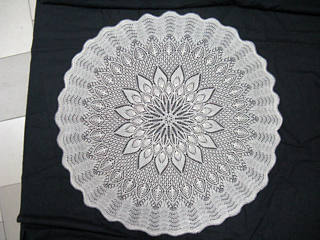patterns >  LittleGreenDragon Knits
LittleGreenDragon Knits
> Green Gables MKAL



















Green Gables MKAL
Lace shawl MKAL originally in 5 parts - now released as a complete pattern.
Both written and charted pattern available in English. The German file is charts only.
Full circle or crescent shape, the choice is yours! Works well as a doily, too.
Difficulty: medium to advanced.
Yarn. Crescent shape: 2 skeins of Zitron Filisilk, 70% merino 30% silk, 656 yards (600 m) / 100g. Full circle: 3 skeins. You can substitute with for instance Fil Royal or other lace yarn with good stitch definition. Long gradients (the kind that has only one transition per colour) and solids are suitable.
If you are using a long gradient and want to use up all your hand dyed yarn, the last chart has enough rows to allow you to keep on knitting until you run out of yarn. You can also end sooner if you have less than the stated yardage. If you are using skinnier yarn (say 1000m/100g) and smaller needles, you will be ok with 100 g.
Size when worked as written and ending on row 162: Crescent shape: 25 inches (65 cm) deep and 70 inches (178 cm) wingspan. Full circle: 50 inches (130 cm) diameter.
Needles: US 4 (3.5 mm) circular needle or the needle you need to get a fabric you like. Double pointed needles (dpns) in the same size for the circular CO if you are working the full circle, or use a long circular and magic loop. Crochet hook for the CO (magic circle crochet CO method used). Cable needle.
Gauge: 20 sts x 28 rows in stockinette stitch is 4 inches (10 cm) blocked and relaxed. As we all know, gauge swatches lie, but I definitely recommend doing a swatch to see what needle size looks good with your yarn.
Beads: Seed beads size 8/0 (full circle in parenthesis) in all 1614 (2256) divided thus: Chart D: 135 (240). Chart G: 644 (896). Chart H until row 162: 835 (1120) Beads are optional. It is possible to use less beads by for instance only beading every second repeat. The pattern lends itself well to using different sizes of beads, too.
Other notions: Stitch markers. Crochet hook or other gizmo for placing beads. If your beads are a little irregular, using a piece of bendable fishing line or the like is a practical solution. Darning needle.
Construction: The shawl is worked in the round (full circle) or back and forth (crescent shape) from the center out. It is bound off using a very narrow sideways knitted on edge. No provisional CO or grafting needed even for the full circle, the final seam is so small (2 stitches) it is virtually invisible.
Schwierigkeit: mittel bis fortgeschritten. Anleitung mit Charts.
Garn: Halbmond-Form: 2 Stränge Zitron Filisilk, 70% Merino 30% Seide, 600 m / 100g. Voller Kreis: 3 Stränge. Der letzte Chart hat genügend Reihen, die dir erlauben solange zu stricken, bis dein Garn zu Ende geht.
Größe: Der Schal kann entweder als voller Kreis in Runden oder als ein ¾-Kreis gearbeitet werden. Wenn wie beschrieben gearbeitet wird und du mit Reihe 162 endest Halbmond-Form: 65 cm tief und 178 cm Spannweite. Voller Kreis: 130 cm Durchmesser.
Nadeln: 3.5 mm Rundnadeln oder eine Nadelstärke, mit der du die gewünschte Textur erreichst. Ein Nadelspiel in derselben Größe für den rund gearbeiteten Anschlag, wenn du den vollen Kreis arbeitest, oder benutze eine lange Rundnadel und den magic loop. Eine Häkelnadel für den Anschlag (wenn die magic circle crochet CO Methode verwendet wird).
Maschenprobe: 24x24 M in glatt rechts sind 10 cm, gewaschen und gespannt.
Perlen: Saatperlen in der Größe 8/0 (Angaben zum vollen Kreis in Klammern) insgesamt 1614 (2256) aufgeteilt wie folgt: Chart D: 135 (240). Chart G: 644 (896). Chart H bis zu Reihe 162: 835 (1120) Perlen sind optional. Es ist möglich, weniger Perlen zu verwenden, wenn du zum Beispiel nur jeden zweiten Mustersatz mit Perlen versiehst. Das Muster bietet sich gut an, Perlen in verschiedenen Größen zu verwenden.
Weitere Werkzeuge: Maschenmarkierer. Eine Häkelnadel oder ein anderes Werkzeug, um die Perlen zu platzieren. Falls die Perlen ein wenig unregelmäßig sind, ist eine biegsame Angelschnur eine praktische Lösung. Nähnadel.
Konstruktion: Der Schal wird in der Runde gearbeitet (voller Kreis) oder in Hin-und Rückreihen (Halbmon-Form) von der Mitte aus. Er wird abgekettet, indem eine sehr schmale seitwärts gearbeitete Kante angestrickt wird. Es wird auch für den vollen Kreis kein provisorischer Anschlag benötigt, die endgültige Naht ist so klein, (2 M) so dass sie nahezu unsichtbar ist.
Vielen Dank an Sabine von www.schafga.be für diese Übersetzung
2442 projects
stashed
2083 times
289 projects
stashed
340 times
- First published: April 2016
- Page created: April 30, 2016
- Last updated: February 24, 2024 …
- visits in the last 24 hours
- visitors right now




